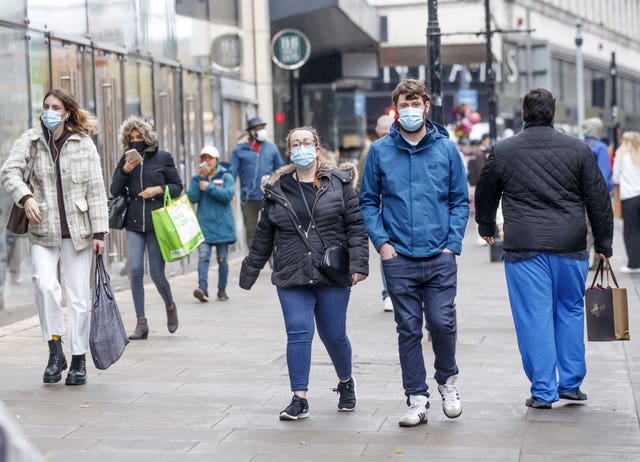What are the new English lockdown regulations and how will they be enforced?
The legislation came into force on Thursday and will expire on December 2.

Justice Secretary Robert Buckland has warned people who commit “egregious breaches” of lockdown rules to expect tougher action.
Here is a look at the new legislation which came into force in England on Thursday, and how it will be enforced.
What is the new law?
The Health Protection (Coronavirus, Restrictions) (England) (No 4) Regulations 2020 puts the lockdown rules into law.
It came into force on Thursday and will expire on December 2.
Other laws introduced in a bid to tackle the spread of Covid-19 also still apply across England.
They include:
The Health Protection (Coronavirus, International Travel) (England) Regulations 2020, which require travellers arriving from a country which is not on the exemption list to self-isolate for 14 days;
The Health Protection (Coronavirus, Wearing of Face Coverings on Public Transport) (England) Regulations 2020, which make face coverings mandatory on public transport.
The Health Protection (Coronavirus, Wearing of Face Coverings in a Relevant Place) (England) Regulations 2020, which make face coverings mandatory in places such as shops and other indoor areas.
All of the laws are subject to exceptions.
What does the new legislation do?
It puts into law restrictions on movement, restrictions on gatherings and the closure of, and restrictions on, businesses.
It means no person can legally leave home without a “reasonable excuse”, with a list of 13 exceptions outlined in the legislation.
A 21-page College of Policing guide for officers states: “The list of reasonable excuses is not exhaustive and it is key that officers exercise judgment in a case where they encounter a person with an excuse that is not included in the list of exceptions.”
Different households are banned from mixing indoors or in private gardens, unless in a support bubble.
But meetings of two people from different households in an outdoor public space, such as a park, are allowed.
Again, there is a list of exceptions, but police guidance states there are fewer exemptions than in the Tier 1-3 regulations.
“Notably, specific exemptions for non-elite sport, protest and wedding receptions have been removed,” it says.

The regulations also mean non-essential shops, leisure and entertainment venues must shut, while bars, pubs and restaurants must stay closed except for delivery or takeaway services.
Who will enforce the law?
According to the College of Policing guidance, police will lead enforcement for breaches of regulations covering restrictions of movement and gatherings.
Officers have been advised to engage with people and explain the changes to the law and offer “encouragement to comply” voluntarily, with enforcement used only as “a last resort”.
Local authorities are expected to lead enforcement relating to breaches by businesses, with police becoming involved “as a last resort”, it states.
What about Covid marshals?
Mr Buckland said an expansion of the number of Covid-19 marshals in local communities will represent a “twin-track” approach to getting people to obey the regulations.
But they have no enforcement powers.
What powers do police have?
If an officer believes someone is outside their home without a reasonable excuse, they can direct them to return home.

Officers can order people in an illegal gathering to disperse or return to their home and can use “reasonable force” to remove someone.
Police can issue someone who is “reasonably believed” to have committed an offence under the regulations with a fixed-penalty notice.
The regulations temporarily amend Section 24 of the Police and Criminal Evidence Act (PACE) 1984, giving officers the power of arrest “to maintain public health” and “to maintain public order”.
College of Policing guidance points officers to existing PACE powers of arrest in relation to ascertaining name and address, and to protect a child or other vulnerable person.
It states: “In this context, this aspect is linked to the spread of infection. Officers may also wish to determine if breach of the peace powers apply.”
An adult with responsibility for a child in breach of the regulations can be told to take them home.
They can also be ordered to ensure a youngster complies with the restrictions after repeated breaches, with a breach of the direction punishable with a fine.
How much can I be fined?
There is a £200 fine for a breach of the new regulations – reduced to £100 if paid within 14 days – which doubles on every offence up to a maximum of £6,400.
Organisers of large gatherings of more than 30 people can be fined £10,000.
Businesses can be fined £1,000 for a first offence, £2,000 for the second, £4,000 for the third and £10,000 for the fourth and subsequent breaches.





